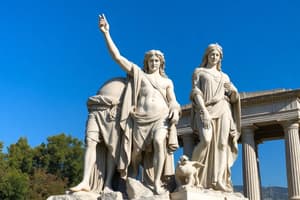Podcast
Questions and Answers
Who is the Roman counterpart of Zeus?
Who is the Roman counterpart of Zeus?
- Juno
- Neptune
- Pluto
- Jupiter (correct)
Which goddess is associated with childbirth, marriage, and family in both Greek and Roman mythology?
Which goddess is associated with childbirth, marriage, and family in both Greek and Roman mythology?
Hera/Juno
Poseidon was the first god associated with the sea.
Poseidon was the first god associated with the sea.
False (B)
Match the following gods with their domain:
Match the following gods with their domain:
What is the role of Apollo in both Greek and Roman mythology?
What is the role of Apollo in both Greek and Roman mythology?
Which Roman goddess has abilities beyond those of the Greek Aphrodite?
Which Roman goddess has abilities beyond those of the Greek Aphrodite?
Who was the Greek god of blacksmiths?
Who was the Greek god of blacksmiths?
What is Hermes known as in Roman mythology?
What is Hermes known as in Roman mythology?
Hestia was the last of the 12 Olympian Gods.
Hestia was the last of the 12 Olympian Gods.
What is the difference between Dionysus and Bacchus?
What is the difference between Dionysus and Bacchus?
Flashcards are hidden until you start studying
Study Notes
Greek vs. Roman Gods
-
Zeus/Jupiter: King of gods; ruled Mount Olympus; married sisters (Hera/Juno). Known for being paternal and kinder. Associated with the sky, light, and victory.
-
Hera/Juno: Queens of the gods; associated with childbirth, marriage, and family. Hera depicted as jealous of Zeus, while Juno focused on family harmony.
-
Poseidon/Neptune: Both gods of the sea; Neptune uniquely associated with the sea in Roman mythology, while Poseidon was not the first god of the sea.
-
Hades/Pluto: God of the Underworld; where mortals go post-death. Pluto also symbolizes wealth from minerals and riches beneath the earth.
-
Demeter/Ceres: Represent food, fertility, and crops. Both associated with the story of their daughters being kidnapped by Hades/Pluto.
-
Athena/Minerva: Goddesses of tactical warfare, arts, and crafts; Minerva more closely linked to arts, while Bellona was the Roman war goddess.
-
Artemis/Diana: Goddesses of the moon, eternal chastity, and the hunt; sisters of Apollo; effectively the same figure in different mythologies.
-
Apollo/Apollo: Identical in both Greek and Roman culture. God of the sun, prophecy, and music; replaced Titan Helios in sun authority.
-
Ares/Mars: Gods of war; Mars characterized as more strategic in battle, contrasting with Ares’ brute force approach.
-
Aphrodite/Venus: Goddesses of love, beauty, fertility; Roman Venus has additional aspects including being a goddess of victory, unlike Aphrodite.
-
Hephaestus/Vulcan: Hephaestus, god of blacksmiths and crafts, could create anything; Vulcan, less known, focused on destructive fire and volcanoes.
-
Hermes/Mercury: Messengers of the gods; both gods of traders and merchants. Hermes engaged with many roles, while Mercury mirrored some of his functions.
-
Dionysus/Bacchus: Both gods of wine; identical roles with different names across Greek and Roman mythology.
-
Hestia/Vesta: Goddesses of the hearth and home; Hestia left her position as one of the 12 Olympians for Dionysus, with Vesta taking on her responsibilities.
Studying That Suits You
Use AI to generate personalized quizzes and flashcards to suit your learning preferences.



